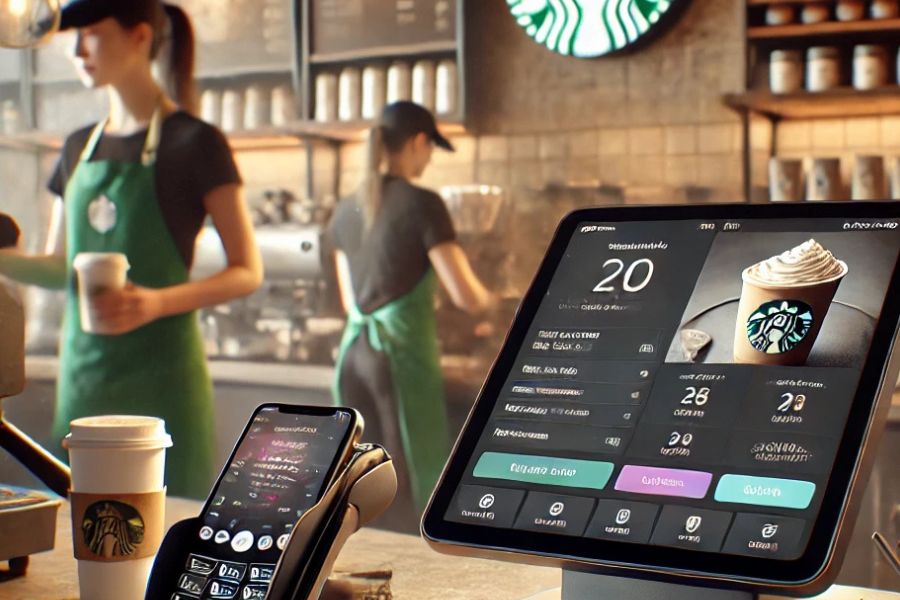In Singapore’s bustling retail landscape, staying ahead of the competition requires innovation and adaptability. With the rise of technology, one tool stands out as a potential game-changer: POS self-service kiosks. These advanced systems offer retailers a secret weapon to elevate their operations and enhance the shopping experience. By empowering customers with autonomy and efficiency, POS sel service kiosks revolutionize traditional retail transactions, promising increased sales and customer satisfaction. Let’s delve into how these kiosks can transform the retail game in Singapore.
Define POS self-service kiosk
POS self service kiosks, or point-of-sale self-service kiosks, are an interactive system designed to facilitate customer transactions without the need for direct assistance from staff members. Essentially, it merges the functionalities of a traditional point of sale (POS) terminal with self-service capabilities, enabling customers to independently browse, select, customize, and pay for products or services.
At its core, a POS self-service kiosk typically features a user-friendly touchscreen interface that guides customers through the purchasing process. Customers can navigate through various options, such as menu items, product categories, or service offerings, and make selections according to their preferences.
These kiosks are equipped with hardware components such as durable touchscreen displays, card readers, barcode scanners, and receipt printers to facilitate transactions seamlessly. The software component of a POS self-service kiosk is a specialized application that allows businesses to customize the user interface, configure workflows, manage inventory, process payments, and generate reports.
In various industries such as retail, hospitality, entertainment, and healthcare, POS self-service kiosks offer numerous benefits for customers and businesses. Customers enjoy the convenience of self-service options, reduced wait times, increased order accuracy, and personalized experiences. Businesses benefit from improved operational efficiency, reduced labor costs, enhanced customer satisfaction, and increased revenue opportunities.
Key features and functionality of POS self service kiosks
User-friendly interface
One of the standout features of POS self-service kiosks is their intuitive and user-friendly interface. Designed with the customer in mind, these kiosks offer a seamless experience, allowing users to effortlessly navigate through the menu, browse available options, and complete transactions with ease. The interface is thoughtfully crafted to minimize confusion and maximize efficiency, ensuring that customers of all technological backgrounds can interact with the kiosk confidently and without any hassle. Whether it’s selecting items, customizing orders, or making payments, the user-friendly interface of POS self service kiosks enhances the overall shopping experience and encourages repeat usage.
Barcode/QR scanning
The advanced barcode and QR code scanning capabilities integrated into POS self service kiosks empower customers to effortlessly scan items for purchase. By simply scanning the barcode or QR code of products, customers can swiftly add items to their cart, expediting the checkout process and enhancing overall efficiency. This intuitive feature not only saves time for both customers and staff but also provides a seamless and convenient shopping experience.
Multi-device compatibility
POS self service kiosks prioritize accessibility by ensuring compatibility with a wide range of devices, including smartphones and tablets. This compatibility empowers customers to access the kiosk interface seamlessly from their preferred device, whether it be their smartphone, tablet, or any other mobile device they may have on hand. This versatility enhances convenience and flexibility, accommodating diverse customer preferences and ensuring a smooth and personalized shopping experience tailored to individual needs.
Integration with existing systems
POS self service kiosks should offer seamless integration with a variety of existing inventory management systems commonly used by retailers. This integration ensures a smooth flow of information and data between different components of the retail operation. By facilitating real-time synchronization of data, such as sales transactions and inventory levels, these kiosks help retailers maintain accurate records and streamline their overall operations.
Multiple checkout options
POS self-service kiosks offer a variety of payment options to accommodate diverse preferences. Whether customers prefer to pay with cash, credit/debit cards, mobile payments, or contactless payments, these kiosks offer flexibility and convenience at checkout. By catering to different payment methods, POS self service kiosks enhance the overall shopping experience and ensure that customers can complete their transactions seamlessly, regardless of their preferred payment method. This versatility fosters customer satisfaction and loyalty, contributing to increased sales and repeat business for retailers.
Security measures and compliance
To ensure the security of transactions and compliance with industry standards, POS self service kiosks are equipped with robust security measures, such as encryption technologies and PCI compliance, safeguarding sensitive customer information.
The benefits of POS self service kiosks
Enhanced customer experience
POS self service kiosks redefine the retail experience by offering unparalleled convenience and efficiency. With intuitive interfaces and seamless navigation, customers enjoy a personalized shopping journey, where they can effortlessly browse products, tailor orders, and finalize transactions independently. By minimizing wait times and maximizing satisfaction, these kiosks elevate the overall shopping experience, fostering long-term customer loyalty and retention.
Increased operational efficiency
POS self service kiosks automate a myriad of tasks, including order-taking and payment processing, which were traditionally managed by staff. By delegating these functions to the kiosks, retailers experience a significant reduction in reliance on manual processes, resulting in streamlined operations, minimized errors, and optimized resource allocation. This newfound efficiency allows retailers to redirect their workforce towards enhancing customer service, refining product offerings, and exploring innovative growth opportunities, ultimately paving the way for unparalleled operational excellence in the retail landscape.
Improved inventory management
POS self service kiosks offer real-time inventory tracking and management capabilities, enabling retailers to maintain accurate stock levels and minimize stockouts. By providing insights into product movement and demand trends, these kiosks help retailers optimize their inventory management strategies, reduce carrying costs, and maximize profitability.
Boosted sales and revenue
Implementing POS self service kiosks can increase sales and revenue for retailers. By enhancing the shopping experience, improving operational efficiency, and optimizing inventory management, these kiosks attract more customers, encourage repeat business, and drive higher transaction volumes, ultimately contributing to overall business growth and success.
Implementing POS self service kiosks in Singapore retail
The current retail landscape in Singapore
Singapore’s retail landscape is dynamic and rapidly evolving, characterized by a diverse mix of traditional brick-and-mortar stores and innovative digital commerce platforms. With the rise of e-commerce and changing consumer preferences, retailers in Singapore are facing increasing pressure to adapt to new trends and technologies to stay competitive in the market.
Traditional brick-and-mortar retailers are facing challenges from the growing popularity of online shopping, prompting them to explore new strategies to attract and retain customers. At the same time, digital commerce platforms are reshaping the way consumers shop, with mobile shopping apps and e-commerce websites offering convenience and accessibility to Singaporean shoppers.
Challenges faced by retailers in Singapore
Despite Singapore’s reputation as a leading retail hub in Asia, retailers face several challenges in the current landscape. These challenges include:
- Labor shortage: Singapore’s retail industry is experiencing a shortage of skilled labor, particularly due to rising costs and talent competition.
- Rising operating costs: retailers in Singapore are grappling with escalating operating costs, including rent, utilities, and labor expenses, which are putting pressure on profit margins.
- Changing consumer behavior: the preferences and expectations of Singaporean consumers are constantly evolving, driven by factors such as technological advancements, urbanization, and globalization. Retailers must adapt to these changing behaviors to remain relevant and attractive to customers.
How POS self-service kiosks address these challenges
In this rapidly changing landscape, retailers must leverage technology to enhance the shopping experience, optimize operations, and differentiate themselves from competitors. Implementing POS self-service kiosks is one such technology-driven solution that can help retailers address the challenges and opportunities presented by the evolving retail landscape in Singapore. These kiosks offer a range of benefits, including improved customer experience, increased operational efficiency, and enhanced inventory management, making them a valuable asset for retailers looking to thrive in the competitive Singaporean market.
POS self service kiosks offer innovative solutions to address the challenges faced by retailers in Singapore:
- Labor shortage: by automating routine tasks such as order-taking and payment processing, POS self-service kiosks help retailers reduce their reliance on human labor and mitigate the impact of labor shortages. This enables retailers to operate more efficiently and effectively with fewer staff members.
- Rising operating costs: POS self-service kiosks help retailers optimize their operational expenses by streamlining processes and increasing productivity. With lower labor costs and improved efficiency, retailers can achieve cost savings and maintain healthy profit margins in the face of rising operating costs.
- Changing consumer behavior: POS self-service kiosks cater to the preferences of tech-savvy Singaporean consumers who value convenience, speed, and self-service options. By offering a seamless and intuitive shopping experience, these kiosks attract and retain customers, driving sales and enhancing customer loyalty in an increasingly competitive market.
Frequently asked questions (faqs) about POS self-service kiosk
- What exactly is a POS self-service kiosk, and how does it differ from traditional POS systems?
A POS self service kiosk represents a paradigm shift in retail technology, offering customers unprecedented autonomy in their shopping experience. Unlike traditional POS systems reliant on staff, these kiosks empower customers to navigate the entire transaction process independently. With intuitive interfaces and interactive displays, customers can browse products, customize orders, and finalize transactions seamlessly. This self-sufficient approach not only enhances efficiency but also provides customers with a sense of control and convenience. By eliminating the need for cashier assistance, POS self-service kiosks redefine the retail landscape, offering a modern solution that aligns with evolving consumer preferences for self-service and digital convenience.
- How can POS self-service kiosks improve the overall shopping experience for customers in Singapore?
POS self-service kiosks enhance the shopping experience for customers in Singapore by providing convenience, efficiency, and autonomy. With intuitive interfaces and easy navigation, customers can quickly find products, customize orders, and complete transactions, reducing waiting times and enhancing satisfaction. Additionally, self-service kiosks offer multiple payment options, including cash, credit/debit cards, and mobile payments, catering to the diverse preferences of Singaporean shoppers.
- Are POS self-service kiosks suitable for all types of retail businesses, or are there specific industries where they are most effective?
POS self-service kiosks exhibit remarkable adaptability, seamlessly integrating into diverse retail sectors ranging from supermarkets to fast food restaurants and apparel stores. While their versatility makes them suitable for a wide array of businesses, their effectiveness shines brightest in environments prioritizing speed, convenience, and efficiency. Specifically, high-traffic retail outlets and quick-service restaurants benefit immensely from the streamlined operations and enhanced customer experience facilitated by POS self-service kiosks. Their ability to cater to the unique demands of these industries makes them indispensable tools for maximizing productivity and customer satisfaction.
- What security measures are in place to protect customer data when using POS self-service kiosks?
POS self-service kiosks are equipped with robust security measures to protect customer data and ensure privacy. These measures may include encryption technologies, secure payment processing protocols, and compliance with industry standards such as PCI dss (payment card industry data security standard). Additionally, retailers can implement measures such as user authentication and data encryption to enhance security further and protect sensitive customer information.
- Can POS self-service kiosks be integrated with existing retail systems and software?
Yes, POS self-service kiosks can be integrated with existing retail systems and software to ensure seamless operation and data synchronization. By integrating with POS systems, inventory management software, and other retail systems, self-service kiosks enable retailers to maintain accurate records, track sales data, and streamline operations across multiple channels. Additionally, integration allows retailers to leverage the functionalities of their existing systems while harnessing the benefits of self-service kiosk technology, ensuring a cohesive and efficient retail ecosystem.
Conclusion
The adoption of POS self service kiosks can be the secret weapon for retailers aiming to excel in Singapore’s competitive retail market. By leveraging the benefits of these kiosks—enhanced customer experience, operational efficiency, and adaptability—retailers can position themselves for success. To unlock the full potential of POS self-service kiosks and ace the retail game in Singapore, contact us for further inquiries and take the first step towards retail excellence.
ConnectPOS is a all-in-one point of sale solution tailored to meet your eCommerce POS needs, streamline business operations, boost sales, and enhance customer experience in diverse industries. We offer custom POS with features, pricing, and plans to suit your unique business requirements.




